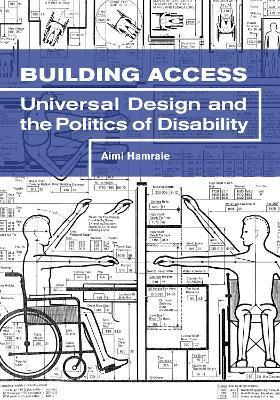Building Access: Universal Design and the Politics of Disability

Building Access: Universal Design and the Politics of Disability
"All too often," wrote disabled architect Ronald Mace, "designers don't take the needs of disabled and elderly people into account." Building Access investigates twentieth-century strategies for designing the world with disability in mind. Commonly understood in terms of curb cuts, automatic doors, Braille signs, and flexible kitchens, Universal Design purported to create a built environment for everyone, not only the average citizen. But who counts as "everyone," Aimi Hamraie asks, and how can designers know? Blending technoscience studies and design history with critical disability, race, and feminist theories, Building Access interrogates the historical, cultural, and theoretical contexts for these questions, offering a groundbreaking critical history of Universal Design.
Hamraie reveals that the twentieth-century shift from "design for the average" to "design for all" took place through liberal political, economic, and scientific structures concerned with defining the disabled user and designing in its name. Tracing the co-evolution of accessible design for disabled veterans, a radical disability maker movement, disability rights law, and strategies for diversifying the architecture profession, Hamraie shows that Universal Design was not just an approach to creating new products or spaces, but also a sustained, understated activist movement challenging dominant understandings of disability in architecture, medicine, and society.
Illustrated with a wealth of rare archival materials, Building Access brings together scientific, social, and political histories in what is not only the pioneering critical account of Universal Design but also a deep engagement with the politics of knowing, making, and belonging in twentieth-century United States.
PRP: 233.91 Lei
Acesta este Prețul Recomandat de Producător. Prețul de vânzare al produsului este afișat mai jos.
210.52Lei
210.52Lei
233.91 LeiLivrare in 2-4 saptamani
Descrierea produsului
"All too often," wrote disabled architect Ronald Mace, "designers don't take the needs of disabled and elderly people into account." Building Access investigates twentieth-century strategies for designing the world with disability in mind. Commonly understood in terms of curb cuts, automatic doors, Braille signs, and flexible kitchens, Universal Design purported to create a built environment for everyone, not only the average citizen. But who counts as "everyone," Aimi Hamraie asks, and how can designers know? Blending technoscience studies and design history with critical disability, race, and feminist theories, Building Access interrogates the historical, cultural, and theoretical contexts for these questions, offering a groundbreaking critical history of Universal Design.
Hamraie reveals that the twentieth-century shift from "design for the average" to "design for all" took place through liberal political, economic, and scientific structures concerned with defining the disabled user and designing in its name. Tracing the co-evolution of accessible design for disabled veterans, a radical disability maker movement, disability rights law, and strategies for diversifying the architecture profession, Hamraie shows that Universal Design was not just an approach to creating new products or spaces, but also a sustained, understated activist movement challenging dominant understandings of disability in architecture, medicine, and society.
Illustrated with a wealth of rare archival materials, Building Access brings together scientific, social, and political histories in what is not only the pioneering critical account of Universal Design but also a deep engagement with the politics of knowing, making, and belonging in twentieth-century United States.
Detaliile produsului










